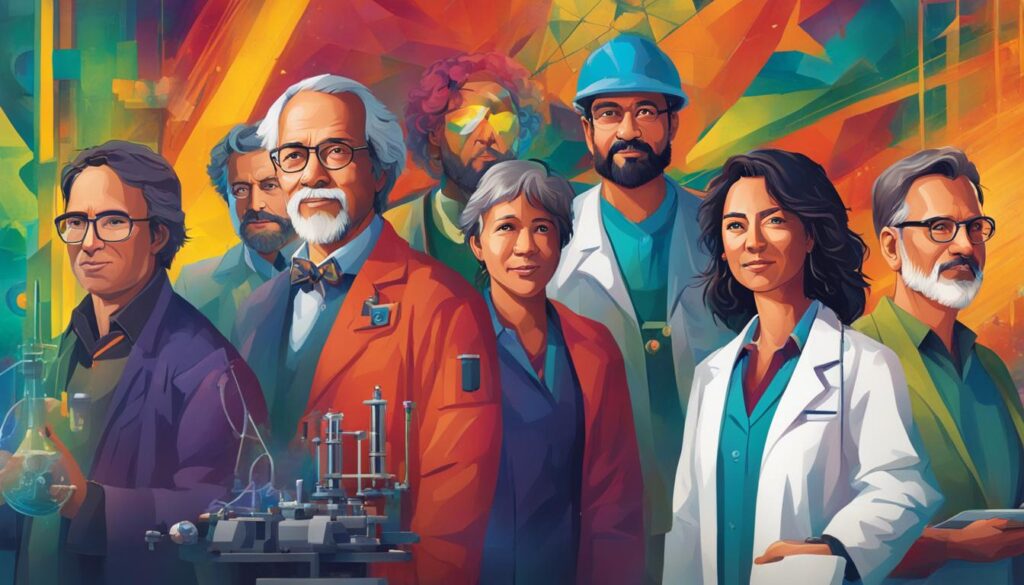Science is an ever-evolving field with remarkable individuals who have made significant contributions in shaping the world we live in. These individuals, often referred to as scientific visionaries, have dedicated their lives to understanding and answering the most pressing questions of our time, transforming the way we think about the world around us. In this article, we will dive into the profiles of notable researchers and their contributions to science. Join us as we celebrate their incredible achievements and explore how they have impacted society as we know it.
The Early Years: Pioneering Curiosity and Passion for Discovery
The scientific visionaries we idolize were not always the great leaders we know today. They too had humble beginnings, from which they grew and nurtured their curiosity and passion for discovery, forging their life’s work.
Take, for example, notable researcher Marie Curie, who grew up in Warsaw, Poland, as the youngest of five siblings. Marie Strasia, her mother, died when Curie was ten years old. This tragedy had a formative and familial effect on her, and she became resolute in her studies, while still maintaining a strong sense of passion and curiosity. Curie was the recipient of a variety of educational scholarships and awards, displaying her natural talent for science. It wasn’t until after her move to Paris that Curie began to take a profound interest in the scientific research that would later make her a defining scientific figure.
Similarly, Stephen Hawking, one of the world’s leading theoretical physicists, had a keen sense of intellectual curiosity from a young age. Diagnosed with ALS at 21, Hawking’s physical limitations did not limit his curiosity, and he completed groundbreaking and influential research through his writings and lectures throughout his life, inspiring future generations of scientists.
Albert Einstein‘s early years were filled with intellectual curiosity, inquisitiveness, and creativity. Born in Germany, the young Einstein was fascinated by mathematical discoveries and natural phenomena. As Einstein grew up and continued his studies, his unique way of thinking and revolutionary approach to science would lead to a reshaping of traditional physics, forever altering our understanding of the universe.
| Scientific Visionary | Early Years |
|---|---|
| Marie Curie | Lost her mother at a young age, won numerous scholarships & developed an interest in science while studying in Paris. |
| Stephen Hawking | Demonstrated an early curiosity for science, despite his diagnosis of ALS at 21, continued to work on groundbreaking research and inspired future generations of scientists through his writing and lectures. |
| Albert Einstein | A childhood of intellectual curiosity and a fascination with mathematics and natural phenomena led to a revolutionary approach to science and a reshaping of traditional physics. |


“Curiosity is a delicate little plant that, aside from stimulation, stands mainly in need of freedom.” – Albert Einstein
Revolutionary Breakthroughs: Advancing the Frontiers of Knowledge
Scientific visionaries have made remarkable breakthroughs that have advanced our understanding of the world in incredible ways. Here are some notable researchers whose contributions to science have reshaped their respective fields:
| Scientist Profile | Contribution to Science |
|---|---|
| Marie Curie | Discovery of radioactivity, isolation of radium and polonium |
| Albert Einstein | Development of the theory of relativity, explanation of the photoelectric effect |
| Charles Darwin | Formulation of the theory of evolution through natural selection |
| Rosalind Franklin | Crucial contribution to the discovery of the structure of DNA |
These visionaries had innovative ideas, methodologies, and experiments that led to significant progress in various scientific fields. Through their dedication and perseverance, the world has been transformed by their discoveries and advancements. These achievements have paved the way for the development of new technologies and have profoundly impacted our lives.
“Science knows no country because knowledge belongs to humanity, and is the torch which illuminates the world.” – Louis Pasteur


Impact Beyond Science: Applications and Societal Influence
Scientific visionaries have not only revolutionized the world of science but have also had a significant impact on society as a whole. Their discoveries and innovations have led to a wide range of practical applications, improved technologies, and transformative changes that have shaped various aspects of our lives.
For instance, the contributions of Marie Curie to the field of radioactivity have resulted in the development of nuclear energy and radiation therapy. Her research has also led to the discovery of new elements, including radium and polonium. Similarly, Thomas Edison’s significant advancements in electric power generation have led to the widespread use of electricity, revolutionizing the modern world.
| Scientific Visionary | Contribution to Science | Impact on Society |
|---|---|---|
| Albert Einstein | Developed the theory of relativity, E=mc² | Contributed to the development of atomic energy, modern cosmology, and GPS technology |
| Jane Goodall | Studied the behavior of chimpanzees in the wild | Advocated for animal rights and conservation, inspiring environmental movements |
| Stephen Hawking | Contributed to the understanding of black holes and the origins of the universe | Popularized science and inspired a new generation of scientists and thinkers |
The impact of these scientific visionaries extends far beyond their individual discoveries and innovations. Their work has led to changes in healthcare, transportation, communication, and various other fields, improving our quality of life and advancing the progress of humanity.


Conclusion
Scientific visionaries are the foundation of modern civilization and their contributions to science have been invaluable. In this article, we have explored the profiles of notable researchers and their remarkable work. Through their unwavering dedication and innovation, these scientific visionaries have revolutionized their respective fields, advanced the frontiers of knowledge and impacted society in profound ways.
We hope this article has provided insight into the lives and work of these extraordinary individuals and inspired readers to appreciate the critical role curiosity, innovation, and the pursuit of knowledge play in shaping our world. As we celebrate the achievements of these scientific visionaries, we must also look to the future with renewed enthusiasm and a commitment to fostering the talent of the next generation of scientists, who will continue to build upon their groundbreaking work.
